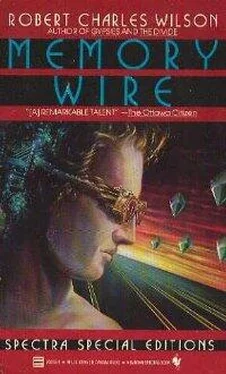Robert Wilson - Memory Wire
Здесь есть возможность читать онлайн «Robert Wilson - Memory Wire» весь текст электронной книги совершенно бесплатно (целиком полную версию без сокращений). В некоторых случаях можно слушать аудио, скачать через торрент в формате fb2 и присутствует краткое содержание. Год выпуска: 1987, ISBN: 1987, Издательство: Bantam Spectra, Жанр: Фантастика и фэнтези, на английском языке. Описание произведения, (предисловие) а так же отзывы посетителей доступны на портале библиотеки ЛибКат.
- Название:Memory Wire
- Автор:
- Издательство:Bantam Spectra
- Жанр:
- Год:1987
- ISBN:978-0-553-26853-9
- Рейтинг книги:4 / 5. Голосов: 1
-
Избранное:Добавить в избранное
- Отзывы:
-
Ваша оценка:
- 80
- 1
- 2
- 3
- 4
- 5
Memory Wire: краткое содержание, описание и аннотация
Предлагаем к чтению аннотацию, описание, краткое содержание или предисловие (зависит от того, что написал сам автор книги «Memory Wire»). Если вы не нашли необходимую информацию о книге — напишите в комментариях, мы постараемся отыскать её.
Memory Wire — читать онлайн бесплатно полную книгу (весь текст) целиком
Ниже представлен текст книги, разбитый по страницам. Система сохранения места последней прочитанной страницы, позволяет с удобством читать онлайн бесплатно книгу «Memory Wire», без необходимости каждый раз заново искать на чём Вы остановились. Поставьте закладку, и сможете в любой момент перейти на страницу, на которой закончили чтение.
Интервал:
Закладка:
He said all this in a restrained, sweetly reasonable voice that reminded Ng of the whine of the hydraulic pumps deep in the mine. He closed his eyes and envisioned Oberg himself as a machine, a whistling construction of pipes and levers and barbed wire and scalding steam. A machine with claws, he thought giddily; iron claws and searchlight eyes.
A guard butted him awake with his rifle.
Oberg was closer now. Oberg was peering into Ng’s face. He was close enough that Ng could smell the American’s sanitized breath, hot and perfumed with mint. And Ng understood suddenly—scrutinizing Oberg from the chair, but aloofly, as if from some higher and cleaner place—that Oberg was a lie. His starched collar was a lie; his slick, receding hair was a lie; the restrained tension ticking at the corner of his mouth betrayed a multitude of lies. Oberg was a lie made of flesh.
“I won’t hurt you,” the American said calmly. “You understand? I’m not here to hurt you.”
And that was a lie too.
“I know you,” Ng whispered.
“I’m sorry,” Oberg said. “I can’t hear you.”
“I know you.”
Oberg frowned.
Ng spoke in spite of himself. A flood of truth into the vacuum of Oberg’s lies. “I know who you are.” He closed his eyes and hoped the guard wouldn’t strike him again. “We marched through Rio Branco,” he said breathlessly. “The villages west of Rio Branco. This was in the spring of ’37, a little after the April offensive. You were famous. Did you know that? Among the Vietnamese, you were notorious.” And Oberg touched him then; Oberg took Ng’s long hair in his hand and jerked his head back against the spine of the chair to make him stop. But Ng kept talking. It was as if he had lost the power to control himself. “We did terrible things. We killed people. Posseiros. Soldiers mostly. Ragged men, but at least they were armed. It would have been so easy to feel guilt. We were machines, you understand, machines made to kill, but it was possible to feel guilt… some of us felt it.”
Oberg cracked Ng’s head against the back of the chair, and Ng was certain he would pass out. Which made him unhappy, because he was enjoying this in some curious way: it was the only act of revenge available to him. But then Andreazza said in his careful English, “We.don’t want to kill him quite yet, Mr. Oberg.” And the American relaxed his grip slightly.
Ng opened his eyes and looked into Oberg’s eyes and understood that the American hated him for what he knew. “We marched out from Rio Branco,” he said, “to clean up after you. Clean up the guerillas, they meant. But you had left another kind of mess.” The memory was vivid, and Ng, lost in it now, became more solemn. “The bodies were everywhere. Women and children. It disgusted us. Even us. It disgusted even us. And in a strange way it made us feel better. We were machines but we weren’t monsters. You proved that to us. You were our consolation. Whatever we had become, there was something worse.” He looked at Oberg and, from the depths of his chair, he smiled. “You made us feel human.”
Oberg whispered between his teeth; the words were inaudible. Ng felt a brief, untethered burst of happiness. It was a kind of victory. “They’ve been gone a long time,” he said. The Americans, he meant. He felt himself drifting out of awareness, but that was all right now. He had said what he wanted to say. “You won’t find them. It’s too late to find them.”
And closed his eyes. And took deep, painful breaths.
Oberg turned to Andreazza. “Kill him,” he said tightly “Kill the slant-eyed son of a bitch.”
“In time,” Andreazza said.
3. The evening before he left Pau Seco, Oberg walked to the gallows hill where the body of Ng had been left to hang overlooking the old town, an object lesson to the illiterate formigas.
The day was windy and overcast, and the body turned restlessly on its pivot of rope. The corpse was bloated with death, and Oberg felt only the faintest connection now between this carcass and the man who had faced him in Andreazza’s office. Hence only a murmur of satisfaction… a shiver of triumph.
The Vietnamese man had lived three more days before he confessed, and the confession he made was useless. Oberg learned the name of the formiga who had bartered away the stone—Morelles or Meirelles—but Meirelles had vanished with the money and was beyond punishment now, lost in some smoky industrial barrio. Such men were untraceable. Raymond Keller and Byron Ostler and the American woman Teresa Rafael had ridden an Eletronorte truck as far as Sinop, Ng had said, and presumably then vanished. Toward the east, Oberg suspected; but there was no way to confirm the suspicion unless they attempted to use credit or buy passage out of the country.
Until then it was a question of laborious pursuit, proceeding first to Sinop and then following their trail wherever it led. Tedious and thankless work, but he was braced for it.
The desolate gallows hilltop made him uneasy. He regarded Ng’s dead, petulant face, and was possessed by a sudden fear that the eyes might spring open, the mouth unlock; that Ng might tumble free and croak out some new and loathsome accusation.
It was crazy, of course. What the dead know, they do not speak. Someone had said that. Someone he did not care to remember.
But the body moved in a river of wind from the Mato Grosso, and Oberg shuddered and turned his back. It was disgusting, he thought. Primitive. They should bury the dead. They should have the decency.
CHAPTER 13
1. Keller went with Byron to a cafe overlooking the docks along the Amazon, where they had agreed to meet an American who could arrange their passage out of Brazil.
The Amazon here was so broad it might have been the sea. The water was brown and turgid; the ships moored at the dock were ocean ships. Keller ordered tucupi and watched an Israeli trawler inch forward from the horizon, its radars and solar panels silhouetted against the margin of the sky. By the time the trawler made port, Byron’s contact had arrived: a stubble-haired combat vet with bright, feverish eyes. He shook hands with Keller but flinched when Byron introduced him by name. Denny.
“This was supposed to be private,” Denny said.
Byron looked at Keller; Keller nodded, put down money for the tucupi, and wandered out along the dock road a little.
He stood against an embankment watching Brazilian stevedores unload a corporate fishing boat, Esperancestenciled in white letters across the gleaming stack flues. Esperance, he thought: hope. A commodity they had just about run out of. Teresa had elected to stay at the hotel, pleading a need for privacy; Keller wondered now if they should have left her.
She was tempted by the dreamstone. They had been in Belem a week, and he had watched the dance she did with it, a nervous pirouette of attraction and fear. Better, of course, to leave it alone until they reached some safer venue. But she was drawn to it. She said so. Fear and hunger…Fear and esperance.
Too, he was worried about the time they were wasting. They were fugitives, and it was too easy to forget or ignore that. The longer they stayed in one place, the more vulnerable they became. Worse, their prospects were not improving. Twice now Byron had attempted to buy them onto a clandestine flight out of the country. Twice the deal had fallen through. Denny was a long shot, friend of a friend, reputedly a smuggler of some kind… but in Belem that was hardly a distinction. The port city was swarming with transients and foreigners, and Keller consoled himself that it was probably the best place to be, under the circumstances. Here, anyway, three indigent Americans were not conspicuous.
Читать дальшеИнтервал:
Закладка:
Похожие книги на «Memory Wire»
Представляем Вашему вниманию похожие книги на «Memory Wire» списком для выбора. Мы отобрали схожую по названию и смыслу литературу в надежде предоставить читателям больше вариантов отыскать новые, интересные, ещё непрочитанные произведения.
Обсуждение, отзывы о книге «Memory Wire» и просто собственные мнения читателей. Оставьте ваши комментарии, напишите, что Вы думаете о произведении, его смысле или главных героях. Укажите что конкретно понравилось, а что нет, и почему Вы так считаете.












